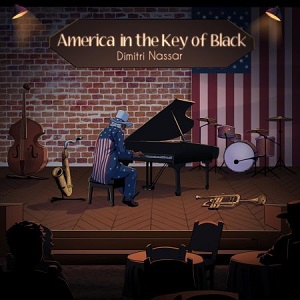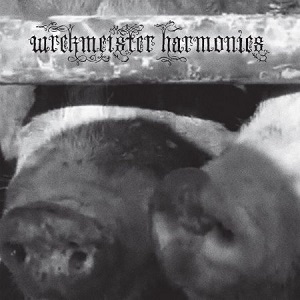Album review overview: Basia Bulat, Dimitri Nasser and more
Dozens of new albums arrive at Maxazine’s editorial staff every week. There are way too many to listen to them all, let alone review them. It ensures that too many albums are left behind. And that’s a shame. That is why today we post an overview of albums that arrive at the editors in short reviews.
Dimitri Nasser – America in the Key of Black
Never before has the threat of all-encompassing war felt so tangible as at this moment, though many baby boomers will assure you they held their breath when Soviet ships approached Cuba to within eighty kilometres in 1962, loaded with nuclear warheads. Still, the threatening language from both east and west makes many break out in cold sweat. There’s nothing wrong with musicians standing up for human rights or even world peace. On the contrary. But it can also be laid on too thick. In “Hum Allah Hum Allah” we suddenly hear a dark voice preaching an unctuous text: peace is what the people want. This continues for a while over a meaningless piano riff until Jamal Moore takes over with a saxophone improvisation and the piece develops. So begins “America in the Key of Black” by pianist Dimitri Nasser, who starts the title piece with a depressing Stars and Stripes, featuring Scott Strother’s mourning trumpet – only to then transform the composition in a two-stage rocket into up-tempo swing jazz where Strother can improvise to his heart’s content. The trumpeter does this with verve, and then you hear that Nasser’s ensemble feels most at home in swing, for example in “Modern Day Blues” with a leading role for drummer Themba Mkhatshwa. It can’t prevent this from being a mediocre album, with the best intentions, but with just too many clichés. And those are deadly in improvised jazz. (Jeroen Mulder) (6/10) (Crescent Piano)
Sunny War – Armageddon in a Summer Dress
In a surprising turn from her folk-blues path, Sunny War steps into rougher, uptempo territory with “Armageddon in a Summer Dress”. This collection of eleven tracks floats between post-punk energy and new wave textures, with War’s vocals flirting with slam-poetry intensity. “Bad Times” opens an unexpected window: a playful organ that paves the way for a groovy, carefree intermezzo amid the raw energy. This isn’t an album that loses itself in aesthetic perfection or ethereal feelings—it’s a record that demands volume and movement. The collaboration with Appalachian soul queen Valerie June adds an intriguing dimension to War’s urban rawness. “Cry Baby” shines as a potential radio hit without losing its identity. This collection surprises through its unpretentious joy—a soundtrack for everyday rebellion, for vacuuming with punk aggression. War’s new sound is a strange but welcome shift, a summer apocalypse that works both as disruptive and liberating. (Jan Vranken) (7/10) (New West Records)
Basia Bulat – Basia’s Palace
In the twilight of her palace, Bulat creates a dreamy soundscape where synths and strings meet. This collection marks an intriguing turn in her oeuvre; away from the folky live performances that brought her fame, towards a more layered electronics-inspired sound. The Canadian singer draws inspiration from nocturnal sessions, Polish disco, and Cohen’s early morning compositions. On “Disco Polo” she weaves a tribute to her father’s musical heritage, while “Baby” transforms vulnerability into an elegant dance melody. Bulat’s voice remains the anchor – filled with emotion floating above MIDI soundscapes and subtle arrangements. The album feels like a time trip through personal memories, with songs that sound simultaneously nostalgic and surprisingly modern. In collaboration with producer Lawson and mixer Martine, Bulat has created a sonic diary that bridges different worlds: between waking and dreaming, between past and present, between experimental and accessible. A daring but successful transformation. (Anton Dupont) (7/10) (Secret City Records)
Wrekmeister Harmonies – Flowers in the Spring
In the experimental sound spectrum, “Flowers in the Spring” unfolds as a dark meditation. Robinson and Shaw’s new creation marks their return to instrumental drone, a conscious deviation from their recent structured works. Across four extended compositions, listeners are carried through distorted guitar landscapes, synthesizer undercurrents, and textural elements that wave like tides under a black sky. The album title deliberately misleads—few flowers bloom here and spring barely reigns. This nearly hour-long sound journey offers no conventional musical narrative but functions as aural therapy comparable to ASMR. Layered guitar textures create a timeless space where sound waves stack like geological formations. Conceptually bold, this album won’t score high commercially due to its uncompromising experiments. Yet it achieves something rarer—a transformative listening experience that works as both an art installation and meditative practice, fascinating in its inaccessibility. (Jan Vranken) (6/10) (Wrekmeister Harmonies)
Civilistjävel! – Följd
In the rarefied, grey space between ambient and techno, Thomas Bodén finds his unique voice. With “Följd” the Swedish producer continues his minimalistic explorations, creating surprisingly rich soundscapes with sparse means. The record opens like a panoramic no man’s land: bare sine bass and melancholic melodica tones slowly draw the listener into Bodén’s hushed world. What follows are nine tracks balancing between the clinical and the hypnotic. The ten-minute “XVI” forms the radiant centre of the record. From a bare, clicking beat gradually unfolds a majestic chord that transforms a deserted landscape into an idyllic meadow. Bodén excels in finding beauty in the small: a simple scale on “XV”, a lonely drone on “XVII” that grows into something almost transcendent. The record closes with Thomas Bush’s vulnerable vocals sliding away into a bed of reverential chords. “Följd” is not an accessible listening experience, but those who have patience discover ever new layers in these seemingly bare compositions. (Jan Vranken) (7/10) (Thomas Boden)










